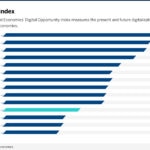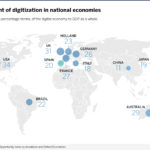The countries leading the fourth industrial revolution
Digitization is primarily an English term. According to a report, the U.S. and U.K. are the countries whose economies are the most prepared for a fourth industrial revolution.

Which countries are at the cutting edge of economic digitization in terms of both their current position and their future potential? Who is leading the start of the fourth industrial revolution? According to a recent study by the consulting firms Accenture and Oxford Economics, the U.S. and the U.K. are the two economies where digitization has the greatest weight on their GDPs, with 34% and 31%, respectively.
Accenture and Oxford Economics created an index called Digital Economic Opportunity (DEO) that analyzes the digitization of 14 developed economies on three different levels: digitization in work environments; workforce skills; each country’s technological equipment (infrastructure); and the influence of the socioeconomic and cultural environment. Taking these factors into consideration, in addition to the two previously mentioned Anglo Saxon countries, Sweden, the Netherlands and Australia did especially well, while countries in southern Europe (Italy and Spain) were at the bottom of the ranking, together with China and Brazil.

The DEO generally shows the future outlook (in the short-term), but the leading countries are also the top-ranking countries in terms of digitization’s relative weight in the economy. Digitization represents 34% of total wealth in the U.S. and 30% in the U.K. Spain, Italy and China’s figures pale in comparison with 20%, 18% and 11%, respectively.
There is clearly room for improvement in Spain, according to the report. In a recent study, Alberto Zamora, Managing Director of Accenture Strategy for Spain, Portugal and Israel focused on the situation in Spain, underscoring its “digitization delay compared to its European peers”. He attributed this delay to several factors: “The lack of a clear digital strategy, the imbalance in digital talent, the complex operating environment for companies and the at times excessively rigid regulation.”

The study indicates that Spain’s GDP could increase by up to $48.5 billion (around €40.7 billion at the current exchange rate, or 4% of the current GDP) over the next four years if its economy accelerates its digitization. The report is less optimistic than the previous edition of the same Accenture report (from 2014) when Spain had a higher DEO. This means that other countries have made greater progress during this two year period. It’s important to note that the index is relative, which means that it measures the different variables in comparison to all the other countries and not as absolute values.
Both Accenture and Oxford Economics largely agree with the report published by the World Economic Forum during the summer of 2016. The non-profit organization behind the Davos Forum reported on which countries were the best prepared for the new economy. The U.S., U.K, Sweden and the Netherlands were in some of the top positions of the ranking, although it was Singapore and Finland that came in 1st and 2nd - two countries that were not included in the Accenture and Oxford Economics’ analysis due to their small size.